This Fund seeks the net asset value per unit to track the performance of the TSE Dividend Focus 100 Index by investing in stocks and real estate investment trust securities (REITs) listed on the TSE Dividend Focus 100 Index.
Key information
| Name: | Listed Index Fund Japan High Dividend (TSE Dividend Focus 100) |
|
| Code: | 1698 |
Net Asset Value and Performance
| Fund Name | Listed Index Fund Japan High Dividend (TSE Dividend Focus 100) Open-end/Domestic/Composite Assets/ETF/Index type |
| Listed Exchange | Tokyo Stock Exchange |
| Issue Code | 1698 |
| Targeted Investments | Stocks and real estate investment trust securities listed on TSE Dividend Focus 100 Index |
| Date Listed | 14 May 2010 (launched on 13 May 2010) |
| Exchange Trading Unit | 10 units |
| Trust period | Unlimited |
| Computation Period | From 9 January to 8 April, 9 April to 8 July, 9 July to 8 October of each year, and from 9 October to 8 January of the following year |
| Closing Date | 8th day of January, April, July and October each year |
| Dividends | All revenue from dividends arising from the trust assets will be, in principle, paid as dividends on the last day of the fiscal year after deducting expenses. *There is no guarantee on the payment or the amount of dividend. |
Fund Expenses
■Expenses to be borne directly by investors
| Subscription Fee | Independently set by Distributors *Please contact your Distributor for further information. *Subscription Fee is compensation for explanation and information providing about the Fund or investment environment, and is also including expense of clerical processing of the subscription. |
| Exchange Fee | Independently set by Distributors *Please contact your Distributor for further information. *Exchange Fee is compensation for clerical processing of the exchange. |
| Amount to be Retained in Trust Assets | None. |
■Costs paid indirectly by the customer for the trust assets (paid from the fund)
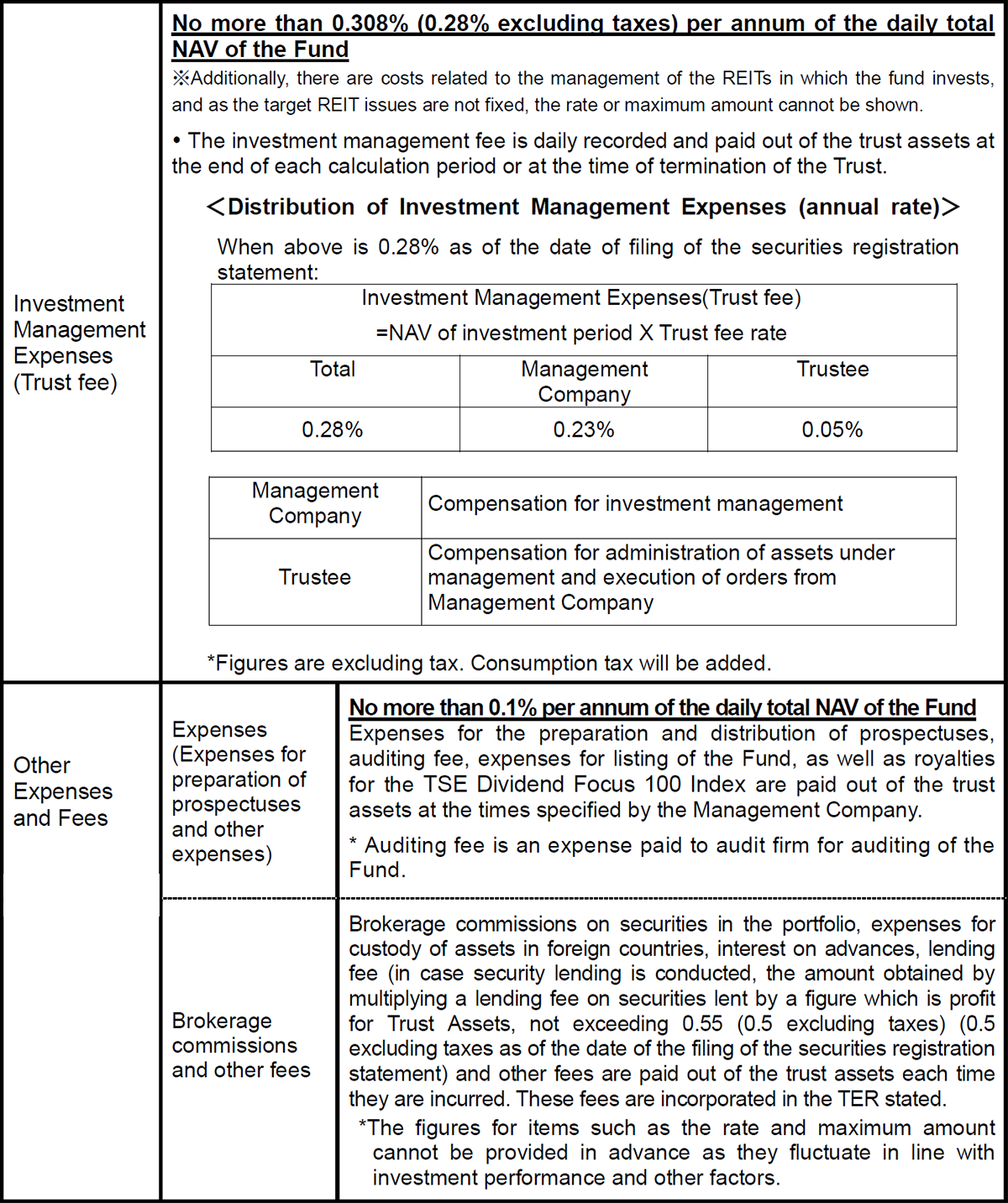
The total amount of expenses of the Fund to be borne by investors varies according to holding length and investment status, and thus cannot be shown.
Major Investment Restrictions
|
Trustee Companies
|
* The TSE Dividend Focus 100 Index consists of 100 issues (90 stocks and 10 REITs) that have been selected based on market capitalization and expected dividend yield. The Index was developed with a base value of 1,000 as of February 26, 2010.
*The constituent issues of this index are reviewed every January and July. The TSE Dividend Focus 100 Index includes the constituent issues from the TOPIX 1000 and the Tokyo Stock Exchange REIT Index (accounts are settled in March, June, September and December) that rank highly in terms of market capitalization and expected dividend yield.

Further Information
Japan Exchange Group (JPX)
Japan Exchange Group publishes summaries and lists of the ETFs, as well as other valuable information on their website.
S&P Global
- Listed ETF iNav
Please click this link to see the iNAV.
*Link to external sites.
Copyright for the TSE Dividend Focus 100 Index
The TSE Dividend Focus 100 Index Value and the TSE Dividend Focus 100 Index Marks or Trademark are the intellectual property of JPX Market Innovation & Research, Inc. or its affiliate (hereinafter referred to as JPX"). All rights and expertise relating to the TSE Dividend Focus 100 Index (including calculation of the stock price index and publication and use of the index value) and all rights relating to the TSE Dividend Focus 100 Index Marks or Trademark belong to JPX.
JPX reserves the right to change the methods of calculation or publication for the TSE Dividend Focus 100 Index Value, to cease the calculation or publication of the TSE Dividend Focus 100 Index Value, or to change the TSE Dividend Focus 100 Index Marks or Trademark or cease the use thereof.
JPX makes no guarantee or representation as to the results derived from the TSE Dividend Focus 100 Index Value and the use of the TSE Dividend Focus 100 Index Marks or Trademark, and as to the TSE Dividend Focus 100 Index Value on a specific date.
JPX does not guarantee the accuracy or completeness of the TSE Dividend Focus 100 Index Value and data contained therein. Furthermore, JPX shall not be liable for the miscalculation, incorrect publication, delayed or interrupted publication of the TSE Dividend Focus 100 Index Value.
This fund is not in any way sponsored, endorsed or promoted by JPX.
JPX does not bear any obligation to give an explanation of this Fund or advice on investments in this Fund to any purchaser of this Fund or to the public.
JPX does not consider the needs of the Nikko Asset Management or purchasers of this Fund in selecting constituent issues used for the calculation of the TSE Dividend Focus 100 Index Value or when making any other related calculations.
Including but not limited to the foregoing, JPX shall not be responsible for any damage resulting from the creation, sale, and promotion of this Fund.
- 21 Feb 2024 — Earnings Report for Fiscal Year ended Jan 2024
- 21 Aug 2023 — Earnings Report for Fiscal Year ended Jul 2023
- 21 Feb 2023 — Earnings Report for Fiscal Year ended Jan 2023
- 19 Aug 2022 — Earnings Report for Fiscal Year ended Jul 2022
- 21 Feb 2022 — Earnings Report for Fiscal Year ended Jan 2022
- 20 Aug 2021 — Earnings Report for Fiscal Year ended Jul 2021
- 19 Feb 2021 — Earnings Report for Fiscal Year ended Jan 2021
- 20 Aug 2020 — Earnings Report for Fiscal Year ended Jul 2020 (9 Jan 2020 - 8 Jul 2020)
- 20 Feb 2020 — Earnings Report for Fiscal Year ended Jan 2020(9 Jul 2019 – 8 Jan 2020)
- 21 Aug 2019 — Earnings Report for Fiscal Year ended Jul 2019 (9 Jan 2019 - 8 Jul 2019)
- 21 Feb 2019 — Earnings Report for Fiscal Year ended Jan 2019 (9 Jul 2018 - 8 Jan 2019)
- 21 Aug 2018 — Earnings Report for Fiscal Year ended Jul 2018 (9 Jan 2018 - 8 Jul 2018)
- 21 Feb 2018 — Earnings Report for Fiscal Year ended Jan 2018 (9 Jul 2017 - 8 Jan 2018)
- 21 Aug 2017 — Earnings Report for Fiscal Year ended Jul 2017 (9 Jan 2017 - 8 Jul 2017)
- 21 Feb 2017 — Earnings Report for Fiscal Year ended Jan 2017 (9 Jul 2016 - 8 Jan 2017)
- 19 Aug 2016 — Earnings Report for Fiscal Year ended Jul 2016 (9 Jan 2016 - 8 Jul 2016)
- 19 Feb 2016 — Earnings Report for Fiscal Year ended Jan 2016 (9 Jul 2015 - 8 Jan 2016)
- 20 Aug 2015 — Earnings Report for Fiscal Year ended Jul 2015 (9 Jan 2015 - 8 Jul 2015)
- 20 Feb 2015 — Earnings Report for Fiscal Year ended Jan 2015 (9 Jul 2014 - 8 Jan 2015)
- 21 Aug 2014 — Earnings Report for Fiscal Year ended Jul 2014 (9 Jan 2014 - 8 Jul 2014)
- 20 Feb 2014 — Earnings Report for Fiscal Year ended Jan 2014 (9 Jul 2013 - 8 Jan 2014)
- 21 Aug 2013 — Earnings Report for Fiscal Year ended Jul 2013 (9 Jan 2013 - 8 Jul 2013)
- 21 Feb 2013 — Earnings Report for Fiscal Year ended Jan 2013 (9 Jul 2012 - 8 Jan 2013)
- 15 Aug 2012 — Earnings Report for Fiscal Year ended Jul 2012 (9 Jan 2012 - 8 Jul 2012)
The term "unit shares" refers to one unit of the basket of stock shares that the investor who applies for an additional subscription will contribute, or one unit of the basket of stock shares that the investor who applies for an exchange will receive in exchange for the beneficiary rights.
In addition to trading in the Tokyo Stock Exchange, investors can apply directly to Authorised Participants for an additional subscription/exchange of this Fund. The application unit in such application is called "unit shares." Please note that the direct application for additional subscription/exchange cannot be processed on certain dates as specified below:
Authorized Participants
- SMBC Nikko Securities Inc.
- ABN AMRO Clearing Tokyo Co., Ltd.
- BNP Paribas Securities Japan Ltd.
- BofA Securities Japan Co., Ltd.
- Citigroup Global Markets Japan Inc.
- Daiwa Securities Co. Ltd.
- Goldman Sachs Japan Co.,Ltd.
- JPMorgan Securities Japan Co., Ltd.
- Mizuho Securities Co., Ltd.
- Morgan Stanley MUFG Securities Co., Ltd.
- Nomura Securities Co., Ltd.
Daily Creation and redemption are based on ETF's NAV calculated in early evening. Confirm non-tradable days by referring to trading calendar on our official homepage. Basket for creation is continually-updated on our official homepage.
Basically sell/buy at last price of T day's market.
The flow chart below is showing the creation/redemption process for Nikko AM ETFs. Please note that transactions cannot be processed for days on which applications are not accepted.
Creation Flow for In-kind Creation/Redemption Type ETFs(Using obligation assumption service by JSCC)
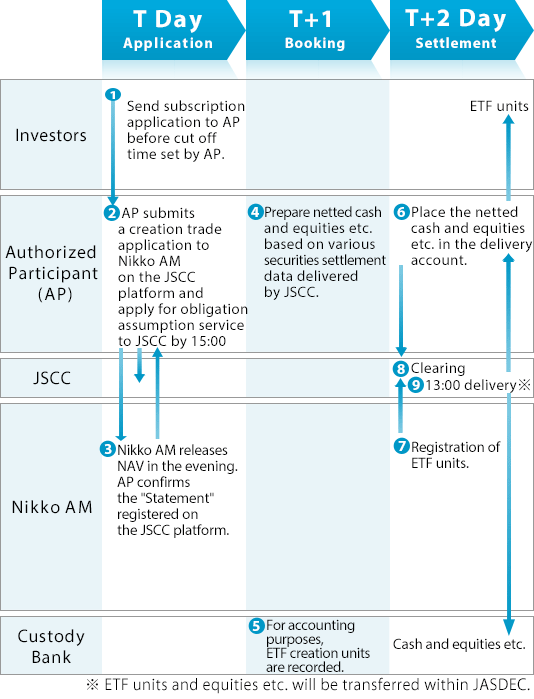
Creation Flow for In-kind Creation/Redemption Type ETFs(Not using obligation assumption service by JSCC)
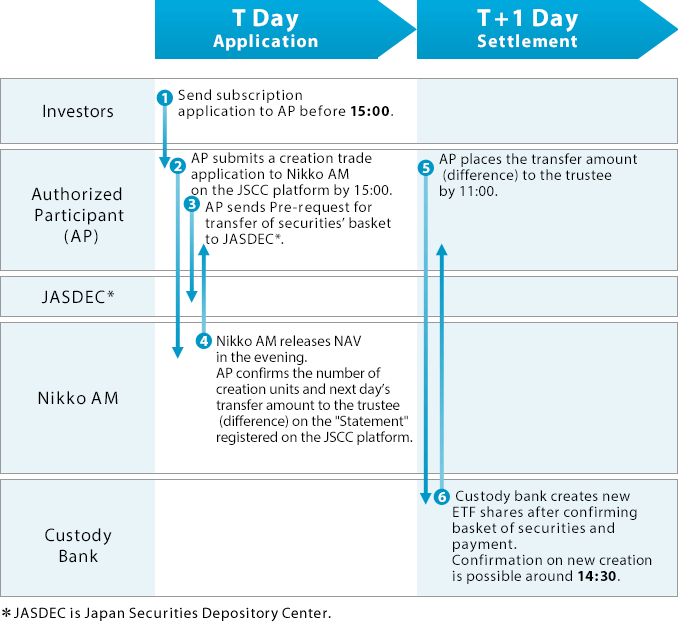
Essential Considerations
- Please secure the basket for creation ETF when making application.
- We recommend you to take measures like borrowing stocks in order to secure the basket for settlement for ETF creation.
Redemption flow for in-kind Creation/Redemption Type ETF(Using obligation assumption service by JSCC)
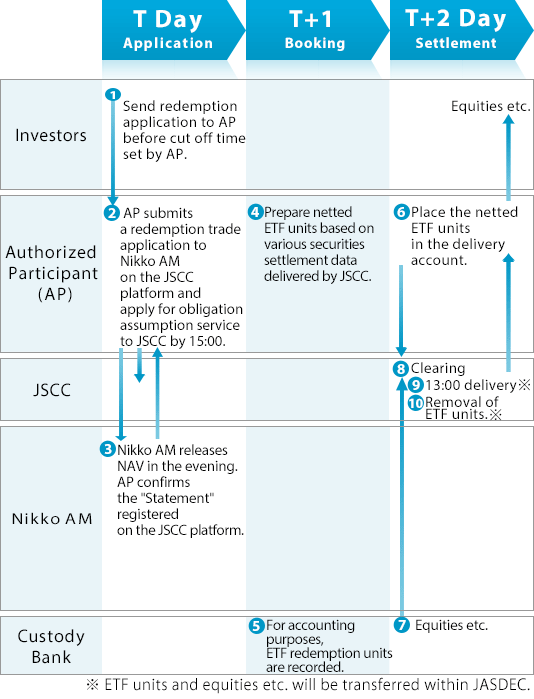
Redemption flow for in-kind Creation/Redemption Type ETF(Not using obligation assumption service by JSCC)
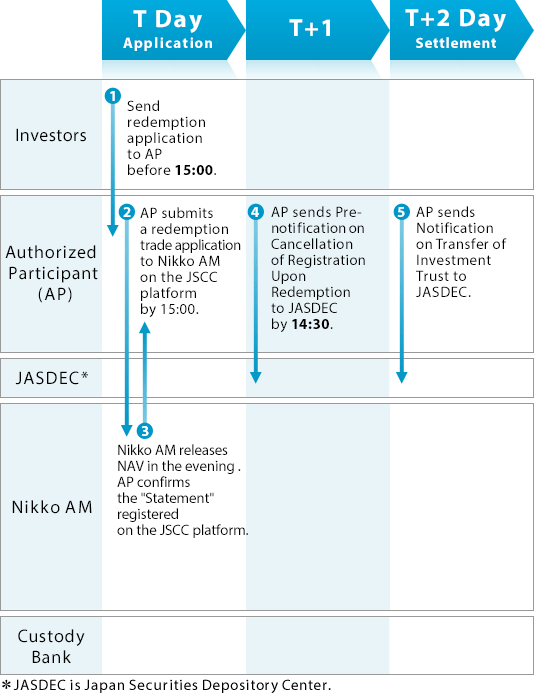
Investors are not guaranteed the investment principal that they commit. Investors may incur a loss and the value of their investment principal may fall below par as the result of a decline in market price or NAV. All profits and losses arising from investments in the Fund belong to the investors (beneficiaries).This fund is different from saving deposit.
The Fund invests primarily in stocks and listed REITs. The NAV of the Fund may fall and investors may suffer a loss due to a decline in stock prices or in listed REITs, or deterioration in the financial conditions and in the business performance of an issuer of stocks or REITS.
Major risks are as follows:
1. Price Fluctuation Risk
Stock prices fluctuate as they are affected by information on the company's growth rate and profitability as well as changes in such information. They also fluctuate as they are affected by economic and political conditions in Japan and abroad. There is a risk that the Fund will suffer material losses if unexpected changes occur in stock price movements or liquidity.
The prices of REITs change due to factors including real estate conditions, the real estate market, long- and short-term interest rate trends, and changes in the macro economy. Deterioration in the financial condition of REITs, financial results, or market conditions may cause a drop in the dividends and prices of REITs, and create the risk of losses to the Fund.
2. Liquidity Risk
In a situation where the market or trading volume is small, the price at which a security can be purchased or sold can be greatly influenced by the size of the transaction, giving rise to the risk that a transaction cannot be completed at the price expected from the market conditions, that a security cannot be sold as appraised, or that the transaction volume is limited regardless of the price level. This could lead to an unexpected loss.
3. Credit Risk
There is a risk that the Fund will incur material losses in the event of a crisis that directly or indirectly affects the business of a corporation in which the Fund invests. The prices of stocks of issuers may substantially decline (possibly to zero) due to fears of default or corporate bankruptcy, which can contribute to decline in the Fund's NAV.
If REITs become, or are anticipated to become, insolvent due to excessive liabilities, major losses may be incurred. Furthermore, REITs may be delisted if they meet certain criteria specified by financial instruments exchanges.
4. Security-lending Risk
Lending of securities involves counterparty risks, which are the risks of contractual default or cancellation following bankruptcy, etc., by the counterparty. As a result, the Fund may suffer unexpected losses. Following the default or cancellation of a lending agreement, when liquidation procedures are implemented by using the collateral that is set aside in the lending agreement, the procurement cost of buying back the securities can surpass the collateral value, due to price fluctuations in the market. In such cases, the Fund is required to pay the difference, which may cause the Fund to incur losses.
Risk of Discrepancy between the TSE Dividend Focus 100 Index and NAV
This Fund seeks to match the NAV volatility with that of the TSE Dividend Focus 100 Index, but it cannot guarantee that movements will be consistent with the Index for the following reasons:
- The Fund may be subjected to a market impact when buying or selling individual stocks as it adjusts its portfolio in response to changes in the stocks that comprise TSE Dividend Focus 100 Index and capital changes among corporations. In addition, the Fund incurs various expenses, including trust fees, brokerage commissions, and audit fees.
- Dividends may be paid by stocks in the portfolio and fees may be earned for securities lent.
- When derivative transactions such as futures are made, there may be disparity between the price movements of such transactions and that of some or all of the constituents of the TSE Dividend Focus 100 Index.
Discrepancy between the market prices at which the stocks are traded at exchanges and the NAV
The Fund is listed in the Tokyo Stock Exchange and the units are traded on that exchange. The market price of the units is affected primarily by the size of demand for the Fund, its performance, and how attractive it is to investors in comparison with their other investments. It is not possible to predict whether the Units will sell in the market above or below the NAV.
* The factors that contribute to fluctuations in the NAV are not limited to those listed above.
Additional Considerations
- This document is produced by Nikko Asset Management for the primary purpose of providing information on the Listed Index Fund Japan High Dividend (TSE Dividend Focus 100), and to increase investors' understanding of this Fund.
- The provisions stipulated in Article 37-6 of the Financial Instruments and Exchange Act ("cooling-off period") are not applicable to Fund transactions.
- This Fund differs from deposits or insurance policies in that it is not protected by the Deposit Insurance Corporation of Japan or the Policyholders Protection Corporation of Japan. Furthermore, units purchased from registered financial institutions, such as banks, are exempted from compensation by the Japan Investor Protection Fund.
- When the Fund faces big redemption causing short term cash requirement or sudden change in the main trading market condition, there can be temporal decline in the liquidity of holding assets, resulting in the risks that Fund unable to trade securities at the expected market prices or appraised prices, or encounters limitation in trading volume. This may result in the negative influence on NAV, suspension of redemption applications, or delay in making payment of redemption.
- When applying to invest in the Fund, please make the decision to invest carefully after taking the time to read the delivered pre-agreement document and other relevant materials in detail.


